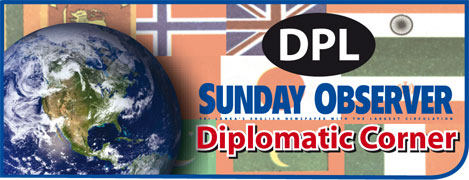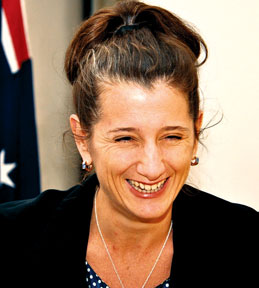
Sri Lankans are resilient - Australian High Commissioner
By Shanika SRIYANANDA
Sri Lanka’s beauty, warmth and politics have brought Kathy Klugman
back to Sri Lanka. Happy to be in the country during 2009 to witness the
end of the conflict, she said. Sri Lankans are strong minded and
resilient, thus they would have a bright future.
| In a candid interview she recalled how
she climbed one of her favourite sites - Sigiriya- in Sri
Lanka when she was heavily pregnant, while people around her
watched in utter amazment. “I love travelling around Sri
Lanka but as my children are small now I don’t go out much.
“ I travelled a lot and love to be in Sigiriya, where I went
several times. One day in 2008 I climbed Sigiriya and came
down and saw a group of cute school children in uniforms who
had come on an excursion. They were from St.Johns College
Jaffna.
 Isn’t it fantastic because three years ago
they couldn’t have come on such a trip. I didn’t return to
Colombo but stayed there as I wanted to climb Sigiriya
again. Everybody who was climbing with me was nervous as I
was eight-months pregnant at that time”, she said the
magnificent Trincomalee Harbour, the spectacular Nallur
festival in Jaffna, the amazing Kandy Perahera and the peace
and tranquillity in Haputale are her favourite events and
holiday destinations in Sri Lanka. Isn’t it fantastic because three years ago
they couldn’t have come on such a trip. I didn’t return to
Colombo but stayed there as I wanted to climb Sigiriya
again. Everybody who was climbing with me was nervous as I
was eight-months pregnant at that time”, she said the
magnificent Trincomalee Harbour, the spectacular Nallur
festival in Jaffna, the amazing Kandy Perahera and the peace
and tranquillity in Haputale are her favourite events and
holiday destinations in Sri Lanka.
Kathy said her childhood was fantastic.
She grew up in a house full of girls, who rode horses with
their mother. Her father- Richard- a Jewish Italian, also a
parliamentarian, is her role model.
Travelling around the globe with her
parents she was five years-old when she had her first
overseas trip with her sisters. Kathy's mother took them
everywhere she went as there was no one at home.
We don’t have maids and nannies to look
after us and we had to manage our work by ourselves. My
mother wanted us to be exposed to different cultures. She
took us to Indonesia, Thailand, the Philippines and in my
teens I went to Europe with my father.
Then I continued my travelling around the
globe when I was in the university. I studied, worked and
during my long holidays I would always take off with friends
and sometimes with my sisters but we never came to Sri
Lanka.
With no mobiles, emails and Skype, I can
still remember how I rushed to make phone calls to my
parents”, she said.
She said the habit of travelling to
different parts of the world and her parents broad interest
in international affairs might have influenced her to take a
diplomatic career.
Today her tight schedule keeps her busy
but whenever she gets breathing space she accompanies her
husband David Durrell, who is a horticulturist, to the
Botanical Gardens Peradeniya and other beautiful places in
Sri Lanka.
“ I spend most of my free time now with
children Sam (15) husband’s son, daughter Ella (5) and
little son Max (2), who was born in Sri Lanka, but I find
time to read and also go out with my friends”, Kathy said.
|
 The Australian High Commissioner Kathy Klugman said the post conflict
era was an incredible opportunity for the country to develop and it was
not impossible under the strong leadership of President Mahinda
Rajapaksa. The Australian High Commissioner Kathy Klugman said the post conflict
era was an incredible opportunity for the country to develop and it was
not impossible under the strong leadership of President Mahinda
Rajapaksa.
Q: What made you join the foreign service?
A: I had no ambition to get into the diplomatic service. But I
was always interested in international affairs. I think I was influenced
by my father who was interested in international affairs.
I studied Asian history and politics at the University of Sydney. I
think it was in my university years that I realised that I was going to
earn my living.
The diplomatic service was attractive because the government pays us
to understand another culture while representing your country. I am
interested in foreign cultures, history and about societies in Asia and
elsewhere.
If you are lucky enough to be selected to the diplomatic service the
government will pay you for it. To me this is what being a diplomat is
all about.
I did my post-graduate degree on Asian politics at the Australian
National University in Canberra and I worked as a Research Officer for
Senator Peter Walsh (former Minister of Finance).
In 1991, I joined the Indochina Section, South-East Asia Division of
the Department of Foreign Affairs and Trade.
Q: How would you describe your career as a diplomat?
A: Most of my overseas assignments have been in Asia. My first
posting was as the Third Secretary to the Australian Embassy, Vientiane,
in Laos in 1993. It was just after the fall of the Soviet Union and the
country was going through a very difficult period. It received a lot of
assistance from the Soviet Union but with the collapse Laos was
isolated. It was a very interesting time and needed to have internal
visas to travel to any place outside the capital city. With very limited
roads, mountainous areas and with a collection of cultures and so many
tribes, it was a fantastic place for a training diplomate. I learnt the
Laotian language.
From 1995-1998 I worked as the Executive Officer at the Disarmament
and Arms Control Branch until I got my posting to Sri Lanka as the
Deputy High Commissioner in 1998. I served here until 2001 and I love
this country very much. It was the time of the conflict and it was a
month before I left that terrorists attacked the Bandaranaike
International Airport. I was worried about the country’s future.
Then I got an appointment as Director, East Timor Section, South and
South-East Asia Division, then as Senior Adviser (Asia) of the Prime
Minister and Cabinet, in 2004 I served at the Flood Enquiry into the
Australian Intelligence System and worked as Assistant Secretary,
Mainland South-East Asia and South Asia Branch of the Department of
Foreign Affairs and Trade from 2004 to 2005.Then I was posted as Deputy
High Commissioner in Singapore. It is a very small island but very
different to Sri Lanka. After my stint as Assistant Secretary, South and
West Asia Branch, Department of Foreign Affairs and Trade, I returned to
Sri Lanka as Australian High Commissioner in 2008.
Q: What were the challenges you faced as a diplomat?
A: I think the biggest challenge is communicating Australian
values, interests and political and historical cultures to countries
that we work in. I think every job I have done overseas and back home
was interesting and challenging. I am a person who loves to work. I like
living in foreign countries and getting to know the diversity of
issues.A remarkable event in my career as a diplomat was that I lived in
Sri Lanka before the end of the conflict. It was in 2009, that the
conflict was coming to a climax and as you know the people and
government of Australia condemned the LTTE. There were very difficult
and tensed times because of the LTTE was phased out after 28 years. I
must say that this period was very tensed and worrying but very
historic. I was here to witness it and was very remarkable era in my
life as a diplomat.
Q: After eradicating the decade long terror, Sri Lanka is
trying to stand on its own. How do you see post-conflict Sri Lanka?
A: There are many opportunities now. Post-conflict time is an
incredible opportunity for this country to come up. It will not be a
difficult task under leadership of President Mahinda Rajapaksa who is a
strong leader. Moving forward in reconciliation is another crucial task
for the government for long-term peace in this country to make sure that
all Sri Lankans feel that they have equal opportunity.
I know that the President is already committed in devolution of power
and has plans for a positive future.
It is very encouraging that the government is focusing more on
development of areas that fell behind due to the conflict.
Q:What is development assistance coming from Australia, are
there plans to increase assistance?
A: The Australian aid has increased substantially over the
last few years. When I arrived in Colombo, three and a half years ago,
we had a longstanding aid program, which granted nearly Aus $ 15 million
every year.
But in the following year it went up to Aus $ 80 million due to
humanitarian concerns after the end of the conflict. When the conflict
was on, with government approval we sent food and medical teams to treat
wounded and injured civilians.
We provided assistance to IDPs in Manikfarm, Vavuniya and then we
began providing reconstruction and development activities in the North.
Australian aid still pours in for de-mining activities in the North. It
is being done much quicker than I thought it would be. Resettling
displaced people has also made good progress.
Resettlement took place much faster than some people really thought.
Still a lot of work has to be done as many people are still not back in
their places of origin. That will take time.
The Australian government funded reconstructing houses, which were
completely destroyed. We built 5,000 houses in Vavuniya, Kilinochchi and
a few in Mannar.
Q:Australia is the most sort after country for Sri Lankan
migrants and with an increasing number of annual applications for
migrations, are there any plans to enhance opportunities for legal
migrations?
A: There are opportunities for legal migration and the
Australian immigration system targets people skilled backgrounds and
qualifications which need in Australia.
Skilled migration regulations are constantly updated to make sure
that they keep pace with Australian economic and social development. The
list of professions that we took last year are different this year.
Australia is a popular destination among Sri Lankan students I think, it
will be great if they return to their country with a love to Australia.
Q: Sri Lanka has plans to tap more tourists to boost the
tourism industry. Do you have any plans to attract more Australian
tourists to Sri Lanka?
A: I personally think there is potential for Sri Lanka to
increase opportunities for more tourists to come to the country.
Last week, I attended the launch of the new tourism strategy by
Economic Development Minister Basil Rajapaksa.
The book and the video are excellent sources of information for
tourists.
This promotional video, which has beautiful images about the hill
country, beaches, places in the North, wildlife, has depicted Sri
Lanka’s beauty.
The video is an excellent piece of professional work and any one who
sees this would definitely come to Sri Lanka.
Q: How do you describe Sri Lanka and its people ?
A: You can get a hint about my feelings for Sri Lanka as I
have came back. I love this country.
The most important thing is this country can go through a successful
reconciliation process it will help to heal the wounds among people
living in different parts of the country.
Sri Lankans are strong minded and resilient. In good times they need
to perform well. They and you are very warm.
My Sri Lankan friends asked me why I don’t come back as the boss. I
just laughed but they were correct. I was very happy to come back. |

